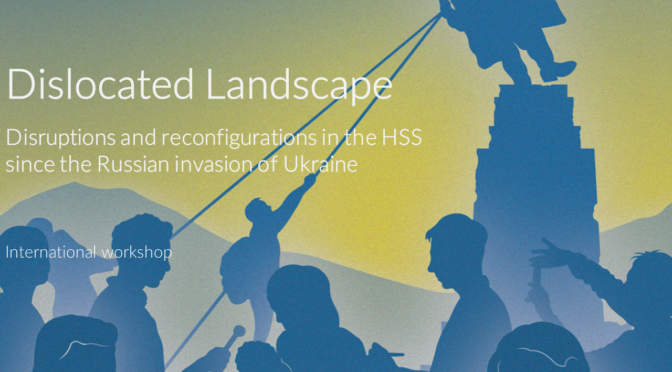Dislocated Landscape. Disruptions and reconfigurations in the Humanities and Social Sciences since the Russian invasion of Ukraine
The workshop is part of the French Research Center in Humanities and Social Sciences (CEFRES) program of non-residential fellowships for Ukrainian researchers in Humanities and Social Sciences, developed in close collaboration with the French Ministry of Europe and Foreign Affairs, the French Embassy and Institute in Ukraine as well as the Ukraine in a Changing Europe Research Center at the Faculty of Social Sciences, the Department of East-European Studies, Faculty of Arts, Charles University, as well as the Institute of Art History and the Institute of Contemporary History of the Czech Academy of Sciences (see: https://cefres.cz/en/20938).
Date: 22 & 23 October 2024
Location: at CEFRES and online (to get the link, please write to the address cefres@cefres.cz)
Language: English
Organizers
Mateusz Chmurski, PhD (CEFRES, Prague)
Pavlo Khudish, PhD (Uzhhorod National University, Uzhhorod)
Valeriya Korablyova, PhD (Faculty of Social Sciences, Charles University, Prague)
Scientific Committee
Prof. Eva Voldřichová-Beránková (Vice-Rector for International Relations, Charles University, Prague)
Prof. Luba Jurgenson (Sorbonne Université, Paris)
Prof. Kateřina Králová (Faculty of Social Sciences, Charles University, Prague)
Sophie Lambroschini (ANR/BFG LimSpaces, Centre Marc Bloch, Berlin)
Gilles Lepesant (CNRS-CEFRES)
Viktoria Sereda (Virtual Ukrainian Institute for Advanced Studies, Berlin)
Partners
CEFRES
Cultures and Societies of Central, Balkan and East-Europe Research Center (UMR 8224 Eur’ORBEM, CNRS-Sorbonne Université), Paris
Ukraine in a Changing Europe Research Center, Faculty of Social Sciences, Charles University (IMS FSV UK), Prague
Thesis
Definitely disrupting the post-Cold war order, the Russian invasion of Ukraine has led to several reconfigurations in contemporary societies, economies or cultures. With its geopolitical impetus, the conflict has not only impeded, but also initiated or strengthened research endeavors in humanities and social sciences. While numerous conceptual, thematic, or institutional changes that have occurred recently will need to be seized and analyzed in the years to come, this dislocated (academic) landscape shall (and needs to) be questioned already.
First and foremost, Ukrainian academia is facing the war and its consequences daily, yet it is also developing ties with its growing scientific diaspora. Security threats, mobility challenges and administrative barriers are only a few of the difficulties being faced. Still, researchers circulate to and from Ukraine, remote programs attempt at connecting and developing science with technological means at our disposal, and the “most documented war” opens a series of epistemological, ethical, legal or “simply” technological questions (discussed e.g. recently at June 4-6, 2024 symposium at the Center for Urban History in Lviv). It is also an evident proof of a huge effort to develop documentation and research in the face of violence, but also to invent new research tools, propose new analytical models, or evaluate the impact of processes and reconfigurations that have occurred.
In the meantime, Western academics try to “retrospect and prospect” (Johnson 2023) to urgently react on ongoing events on popular (and political) demand. Numerous ongoing reconfigurations of institutions, positions and research programs testify to a situation where expertise (and often experts themselves) suddenly appears painfully lacking. As a result, Ukrainian scholars in the West moved suddenly from facing epistemic mistrust to experiencing epistemic exploitation (Khromeychuk 2022: 194). Symbolic measures are being (finally) taken: to quote only one but significant example, after the visit of the First Lady of Ukraine in Paris, a chair of Ukrainian Studies is supposed to be recreated after years of absence at Sorbonne University, in the Central-European Studies Department, becoming the second active in all France.
Is it that instead of speaking about, academia may be finally speaking with Ukrainian research? It is uneasy to say at this stage, in the rapidly changing context of “a palimpsest of narratives” growing constantly in density (Korablyova 2022). Therefore, it seems even more important to regularly take a step back, if it is possible, and have a joint, interdisciplinary reflection on recent evolutions in academia across disciplines, no matter how difficult any attempt on a synthetic approach may appear.
In continuation with the 2023 edition of the workshop with CEFRES non-residential fellows in humanities and social sciences, the 2024 edition aims at “mapping the landscape”: addressing methods, models and objects at the center of current academic attention of the 21 non-residential fellows in humanities and social sciences present at CEFRES, representing 9 academic cities all around Ukraine. They will be exchanging with invited chairs and discussants from CEFRES Platform partners: the Czech Academy of Sciences, Charles University, but also French and Central European academic institutions. In the preparatory works three main domains of particular interest for nowadays Ukrainian research have emerged and will be considered:
Art, literature, and politics: processes, practices and heritages
- art, identities and visual culture: from iconoclasm to museum spaces and propaganda strategies
- culture, language and national identity: ideologies & behaviors
- literature and/in society: history, war, traumas of the present and of the past
- state and preservation of movable, monumental, and intangible cultural heritage
- Ukrainian humanities in the 20th century
Postcolonial, decolonial & memorial stakes in their implications, local to global
- dichotomies between local and global, subjective and universal, common and individual in the displaced landscape of contemporary humanities and social sciences
- post-imperial, post-colonial cultures & entanglements: the case of Ukraine in a regional/areal/European or global perspective
- representations of the war: reflection of trauma and processes of collective memory formation
- heroic trajectories, discourses and processes of war(s) memorialization
- globalization: changes, models, previsions in societal and economic processes
UA / EU and the war: current state, transformations & future
- digital transformation of the economy: effects (artificial intelligence, blockchain, IoT…), business models, labor markets and democracy (incl. green economy and low-carbon trends)
- data economy and analytics: big data, machine learning, algorithms for forecasting economic indicators, trends, business processes
- social and economic inequalities: causes, consequences, policies
- migration and economic integration: impact & consequences
- forecasts for the economy of Ukraine in the post-war period
The program will be published in September.

